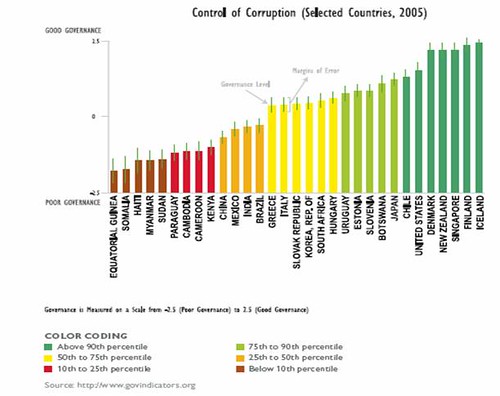Control of Corruption (2005)
 Here is an interesting link to a World Bank Library of indicators on governance. This retrospective study focused on the period from 1996 - 2005. Materials are updated on an annual basis.
Here is an interesting link to a World Bank Library of indicators on governance. This retrospective study focused on the period from 1996 - 2005. Materials are updated on an annual basis.
The study warns against "Afro-Pessimism" noting that African nations such as Botswana, Ghana, Senegal, Sierra Leone, Mozambique and Liberia have made progress in improving governance and curbing corruption. In fact, Ghana, Botswana, Mozambique, Tanzania, and Senegal have made great strides. Mozambique is interesting in that it is a post-conflict country that has experienced a number of severe natural disasters...and yet progress has been made.
Indicators used are as follows; (1) Voice and Accountability; (2) Stability/No Violence; (3) Government Effectiveness; (4) Regulatory Quality; (5) Rule of Law; and (6) Control of Corruption.
Whither Haiti? Here is how it fared in 2005 (in percentile ranking):
Voice and Accountability: 10.1%
Political Stability/No Violence: 3.8%
Government Effectiveness: 5.3%
Regulatory Quality:11.9%
Rule of Law: 1.9%
Control of Corruption:1.0 (!)
A couple of thoughts come to mind when I read this.
First, at least we beat Sudan.
Second, I think that if this study were to have indicators for creativity, sense of humor, hospitality, and friendliness that Haiti would be near the top of the charts. But alas, this is a study of governance. Maybe next time.
Third, this study is more than a little ironic considering that the World Bank has caused a good deal of suffering in Haiti and some of its past policies encouraged corruption. Haiti and the DR were on the same level 25 years ago. Dominican leaders got rich by encouraging the private sector and skimming off the top. Haitian political leaders became rich by keeping the country poor and skimming money from the international community. The World Bank gave a poorly monitored grant to Haiti to pave all three national highways. Needless to say the money was stolen. But whose fault is that? Should an international organization assume all its clients are going to be honest or does it set systems in place that let them know the difference? Haiti became a kleptocracy because organizations like the World Bank kept giving.
Fourth, ninety nine percent of other countries are less corrupt than Haiti. This is an amazing feat. Clearly we know where to start. With high levels of corruption, I am not sure that decent scores on any of these other indicators are possible without taking care of the corruption problem.
It is a shame that many young men will grow up without knowing a national role model. Who knows, Preval might be the one to start turning the ship around. Still, most heroes are operating at the community level....the folks Haiti Innovation partners with. There are of course national heroes such as Jean Dominique (from Agronomist fame), but their lives are often cut short and the rural youth grow up without knowing of their importance. In my village, certainly more young boys knew Arnold Schwarzeneggher than Jean Dominique.
So clearly we have nowhere to go but up. We may took a look at other countries and see what works. The Haitian government is debating right now how many and what kind of cars to buy (again) for Parliament. Might we suggest a lesson from Ghana where politicians were required to drive used vehicles? Other scales of measurement suggest there is a clear correlation between women in a government and a reduced level of corruption. Haitian women are an incredible, yet under-appreciated resource. Affirmative action for women? For the betterment of the country, let's hope so.
The police (escorted by Minustah) recently conducted their first patrol of Cite Solei in years. This is a major step in the right direction...provided the police force can be legitimized. Many police officers I knew sold drugs, or robbed from houses in the villages they were supposed to protect. Even at the expense of shrinking the police force, an honest and visible presence would go a long way. Lessons from New York City can be applied, provided they apply to everyone.
At the end of the day, this is a study of governance....not of a people. The Haitian people are very different than the governments that have represented them. They have been let down again and again....and yet, I have rarely been let down by Haitian friends. I hope they will yet have a government that respects the people and strives to meet their needs. Tackling corruption is the right place to start.
Bryan

Add new comment